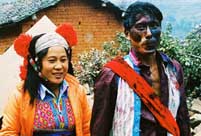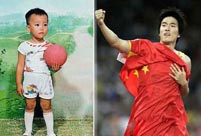Liu says his dream was always “to educate the next generation of lawyers,” hoping some of them would ascend to high positions of power and improve China’s legal system. In retirement, he now has the time to counsel young attorneys and is writing a book about the strangest cases he has handled.
“I had the dream of saving my country when I was young,” says retired physics teacher Zhang Liqiang, 89. “It was very common among my classmates. We organized campaigns and mailed our donations to support the Chinese army.”
In the 1940s and early 1950s, parents frequently gave their children names reflecting their hopes for the country. Liqiang means “power and stronger.”
Zhang says Qian Xuesen, the late missile and space program scientist, was his role model. Qian returned to China in 1955.
Patriotism
At the time, he was already a renowned scientist in the United States — one of the founders of the Jet Propulsion Lab at the California Institute of Technology.
Back home, Qian laid the groundwork for China’s missile and space programs and became an inspirational figure for his patriotism and sacrifice.
In the first years after 1949, patriotism was widespread, which sometimes led people to become overly optimistic about the future.
The Great Leap Forward (1958-60) galvanized the nation and promised that China would overtake the industrial production of Britain in 10 years and the United States in 15 years.
“The pay was good, but I worked for seven days a week, and 14 hours a day,” says Han Tianheng, 73, a renowned artist and collector. “There really wasn’t any time or energy left for personal dreams.”
He decided to give up the good pay and pursue his true passion in life — engraving seals. But he had to do it secretly in those days because practicing ancient traditions was condemned.
The hard times of the 1950s were followed by the “cultural revolution” (1966-76). It, too, stifled personal dreams. Most people just tried to keep their heads down to avoid criticism or even attacks from gangs of young zealots.
When China announced its open-door and economic reform policies in 1978, a new era dawned.
“We really benefited from the policy,” says 67-year-old Han Linxiu, who was a farmer for 16 years and now serves on the committee for the elderly in the Jingting Neighborhood of the Minhang District.
“Many old people comment on how much better life is today,” she adds. “Our pension has increased, we have a community center where everything from tea to a pool table is free and we have group birthday parties. Many old people dream of traveling abroad, learning chess game or saving a lot of money.”

 Pakistan suffers desperate shortage of water
Pakistan suffers desperate shortage of water Lanzhou MAC conducts actual-troop live-ammunition drill
Lanzhou MAC conducts actual-troop live-ammunition drill Heritage train ride across western Kosovo
Heritage train ride across western Kosovo Heavy rain hits Hangzhou, causing traffic jam
Heavy rain hits Hangzhou, causing traffic jam Students wade through water to school
Students wade through water to school Dabaiyi wedding ceremony in China's Yunnan
Dabaiyi wedding ceremony in China's Yunnan Harbin named Chinese city with most beautiful women
Harbin named Chinese city with most beautiful women Weekly Sports Photos: Bale transfers to Real Madrid
Weekly Sports Photos: Bale transfers to Real Madrid Funniest photos of sport stars as kids
Funniest photos of sport stars as kids  Residences of the royal house of Savoy
Residences of the royal house of Savoy China's frigate 'Bengbu'in fire training
China's frigate 'Bengbu'in fire training The last days of Wan Aihua
The last days of Wan Aihua Highlights at 12th National Games of China
Highlights at 12th National Games of China Beijing Film Academy welcomes freshmen
Beijing Film Academy welcomes freshmen 2013 Taiwan Int'l Tourism Expo kicks off in Taipei
2013 Taiwan Int'l Tourism Expo kicks off in TaipeiDay|Week|Month